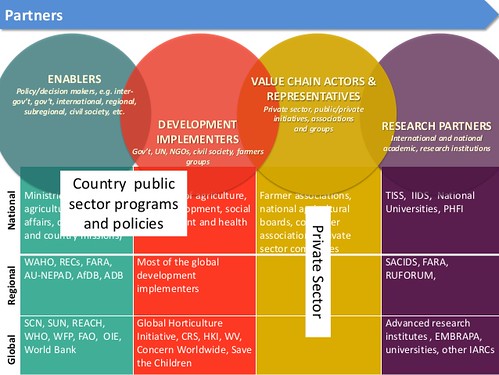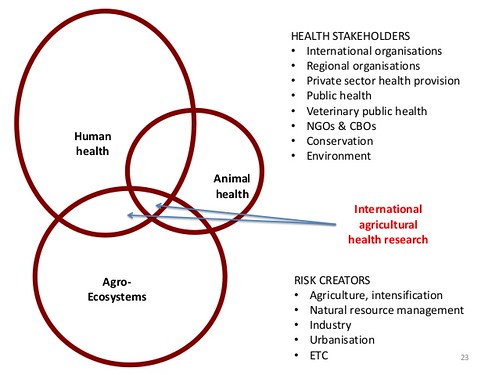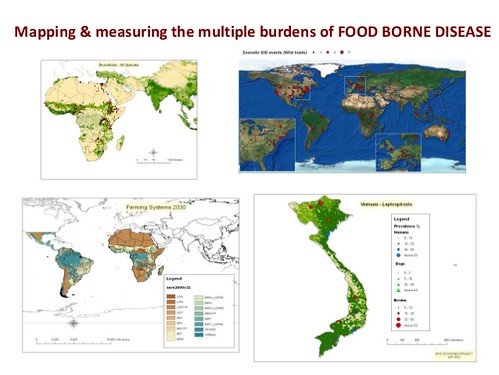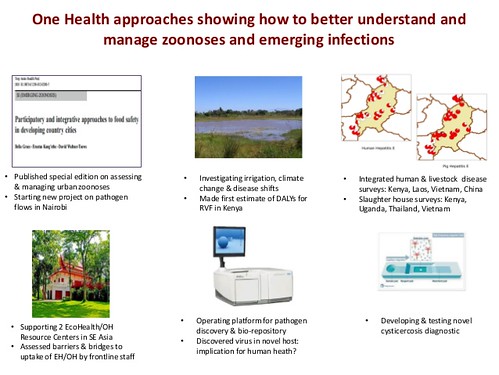CGIAR Research Program on Agriculture for Nutrition and Health: This program focuses on one of five strategic objectives of CGIAR (Slide 3 of ‘A4NH–Presentation for Discussion with Donors and Partners’, Jun 2013; credit: CGIAR Research Program on Agriculture for Nutrition and Health).
Veterinary epidemiologist and food safety expert Delia Grace is in Montpellier, France, this week, along with a lot of other distinguished folk in the business of doing agricultural research for development in poor countries. Research leaders at 15 CGIAR centres, representatives of CGIAR funding organizations and key CGIAR partners are getting together in this town, the capital of ‘southern France’ and the location of the CGIAR Consortium, to update each other on where they are in a new(ish) series of multi-centre, multi-partner, multi-country and multi-disciplinary CGIAR research programs tackling big issues such as climate change, water scarcity and empowerment of women.
Grace oversees one of four components of one of these 16 big new CGIAR Research Programs—Agriculture for Nutrition and Health—which works to adapt agricultural practices and policies to improve human health. The whole program is led by John McDermott, another epidemiologist, who is based at the International Food Policy Research Institute (IFPRI), in Washington, DC. Grace’s component, which she leads from her base at ILRI’s Nairobi campus (where Mcdermott served for many years, first as scientist and then as deputy director general for research), is investigating ‘agriculture-associated diseases’, with specific focus on improving food safety, controlling zoonotic diseases and diseases emerging from animals, and reducing other health risks in agro-ecosystems in the developing world.
Partners of the CGIAR Research Program on Agriculture for Nutrition and Health: Slide 33 of ‘A4NH–Presentation for Discussion with Donors and Partners’, Jun 2013 (credit: CGIAR Research Program on Agriculture for Nutrition and Health).
Last week, McDermott and Grace and other leaders in the ‘CGIAR Research Program on Agriculture for Nutrition and Health’ gave their CGIAR scientific colleagues, partners and donors an overall presentation of their program. Highlighted below are slides concerning Grace’s component on ‘Prevention and Control of Agriculture-Associated Diseases’.
Below, view the whole presentation: A4NH–Presentation for Discussion with Donors and Partners, June 2013:
For more information, visit the landing page on the CGIAR website for the project ILRI’s Delia Grace leads on Agriculture-Associated Diseases or the project’s website and blog: AgHealth.






The use of wastewater for agriculture is becoming more and more widespread in Senegal, especially in the areas around Dakar, where many programs designed to stimulate and make horticultural activities viable alternative were put in place. It should be noted that about 200,000 m3 of domestic waste water is evacuated daily in Dakar. The development of sanitation infrastructure has not kept pace with the rapid expansion of urban areas. Coming from factories, households, markets, hospitals, etc., wastewater ends up in streets, riverbeds, rainwater drains, or in small-capacity water treatment plants. It is generally near these wastewater sources, which are more or less stagnant, that plots are gardened, mainly by either poor inhabitants from peri-urban zones, or rural migrants. In these cases the use of all types of wastewater is unplanned and unregulated, and ends up being used for urban gardening, including the watering of vegetables destined to be eaten raw. The main risk associated with reusing this water is one of sanitation, due to the survival of the pathogenic germs it contains. One our study shows the importance of monitoring samples collected in the environment for the presence of virulence and resistant microorganisms. It was shown that the raw wastewater is a reservoir for a variety of virulence factors associated with ExPEC and EHEC, and that the treatment of effluents is very important.
Agricultural-associated diseases inparticular to my field of study ,zoonotic ones are important .So as a public health veterinarian I advise ILRI to participate in urban areas to control public health hazards which are caused by cnsumption of food of animal origions.